The 7th Annual Grammy Awards were held on April 13, 1965, at Beverly Hilton Hotel, Beverly Hills. They recognized accomplishments of musicians for the year 1964. João Gilberto & Stan Getz won 4 awards.

Eumir Deodato de Almeida is a Brazilian pianist, composer, arranger and record producer, primarily in jazz but who has been known for his eclectic melding of genres, such as pop, rock, disco, rhythm and blues, classical, Latin and bossa nova.

Luiz Floriano Bonfá was a Brazilian guitarist and composer. He was best known for the music he composed for the film Black Orpheus.
"Crickets Sing for Anamaria" is the English-language version of "Os Grilos", a song written by Brazilian musician Marcos Valle with his brother Paulo Sérgio Valle.
Ithamara Koorax is a Brazilian jazz and pop singer. For several years, she was voted one of the best jazz singers of the world by DownBeat Readers Polls. In 2008 and 2009, Koorax placed third on the "Female Vocalist" category on the 73rd DownBeat Readers Polls, with Diana Krall on the first place and Cassandra Wilson on second,, as well as on the 74th Annual Readers Poll.
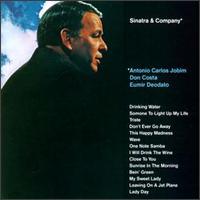
Sinatra & Company is an album by American singer Frank Sinatra released in 1971.
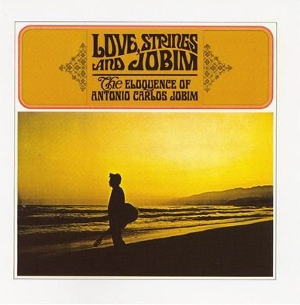
Love, Strings and Jobim is a 1966 album by various Brazilian artists who play new Brazilian songs by various composers. Because Antônio Carlos Jobim is pictured on the cover and mentioned in the title, he has been and continues to be credited to be the performing artist on the album. Jobim does not appear on the album except as a composer of two of the twelve songs. The original Brazilian title of this album is "Tom Jobim Apresenta" and it appeared on the Elenco label.
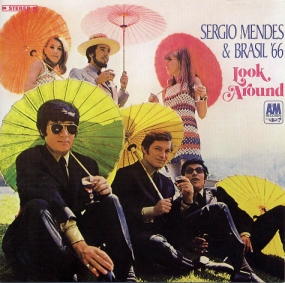
Look Around is the third studio album by Sérgio Mendes and Brasil '66. It was released in 1967. Following this album, Mendes dismissed the musicians and singer Janis Hansen and brought in Karen Phillip to sing with holdover Lani Hall.

The Sugar Man is an album by Stanley Turrentine. The recording is a compilation of four separate dates, each with different conductors, arrangers and other personnel. The album was recorded in 1971 after his successful debut, Sugar for the CTI label, but not released until 1975 after Turrentine had left for Fantasy Records.

When It Was Done is an album by Brazilian keyboardist Walter Wanderley featuring performances recorded in 1968 and released on the CTI label.

Tell It Like It Is is the seventh album by American guitarist George Benson featuring performances recorded in 1969 and released on the A&M label.

Gilberto with Turrentine is an album by Brazilian samba and bossa nova singer Astrud Gilberto and American saxophonist Stanley Turrentine featuring performances recorded in 1971 released on the CTI label.
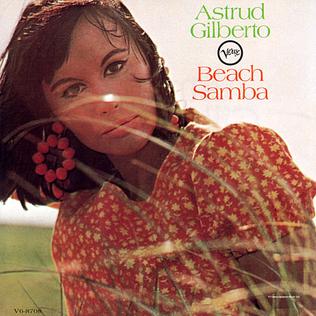
Beach Samba is a 1967 studio album by Astrud Gilberto, arranged by Eumir Deodato and Don Sebesky.

Now is a studio album by Brazilian bossa nova singer Astrud Gilberto, released on Perception Records in 1972. The album was recorded at Blue Rock Studio, New York City.
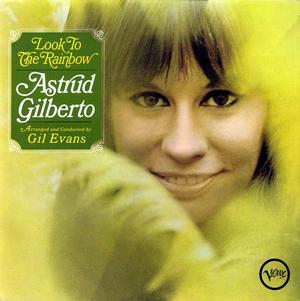
Look to the Rainbow is a 1966 album by Astrud Gilberto, arranged by Gil Evans and Al Cohn.
"The Gentle Rain" is a 1965 bossa nova composition by Luiz Bonfá, with lyrics by Matt Dubey. Originally written in A minor key and 4/4 time, this song was first released as part of the motion picture soundtrack of the 1966 film The Gentle Rain of the North-American director Burt Balaban. The music of the film was a collaboration of Luiz Bonfá as a composer and Eumir Deodato as orchestra arranger and director.

Samba '68 is a 1968 album by Marcos Valle, arranged by Eumir Deodato.
"Ela é Carioca" is a bossa nova song composed in 1963 by Antônio Carlos Jobim, with Portuguese lyrics by Vinícius de Moraes. English lyrics were written by Ray Gilbert. The song is sometimes titled "Ele é Carioca ."
"Vivo Sonhando" is a bossa nova song from 1962 with words and music by Antônio Carlos Jobim. English lyrics were added later by Gene Lees.
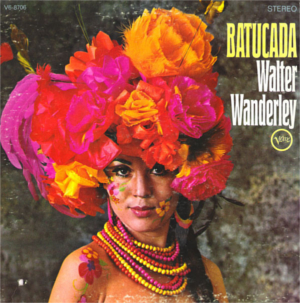
Batucada is a 1967 album by Brazilian musician Walter Wanderley. Batucada refers to a fast and repetitive style of samba music played with percussion instruments and is used as an intro on the third track, "Batucada."














